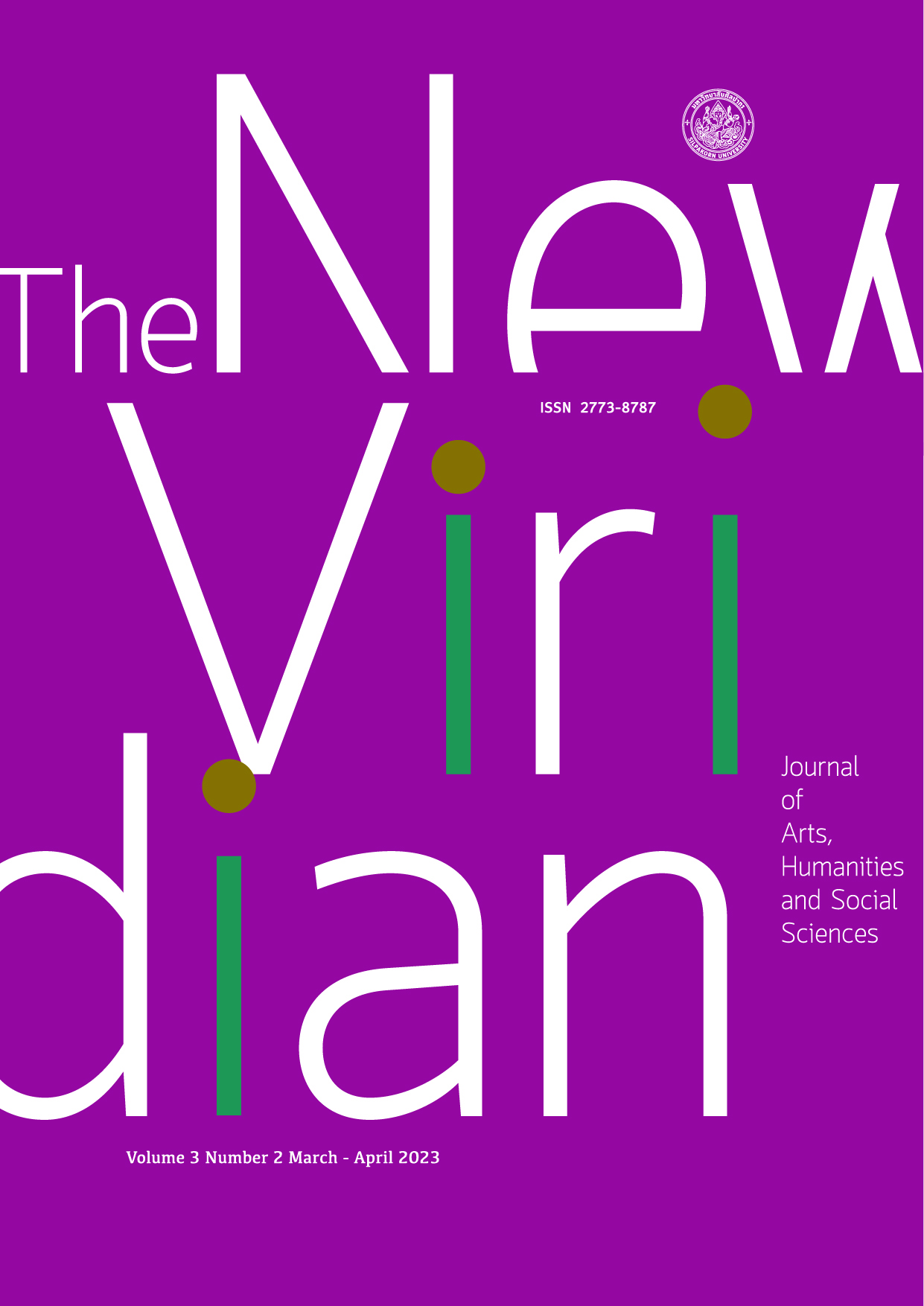ความสัมพันธ์ระหว่างการแลกเปลี่ยนความสัมพันธ์ระหว่างผู้นำและสมาชิกกับความไว้วางใจโดยมีการเล่นพรรคเล่นพวกของหัวหน้างานเป็นตัวแปรกำกับ (The Relationship between Leader-Member Exchange and Trust: The Moderating Effect of Leader Favoritism)
คำสำคัญ:
การแลกเปลี่ยนความสัมพันธ์ระหว่างผู้นำและสมาชิก, การเล่นพรรคเล่นพวกของหัวหน้างาน, ความไว้วางใจบทคัดย่อ
งานวิจัยนี้เป็นการศึกษาวิจัยเชิงปริมาณ โดยมีวัตถุประสงค์ของงานวิจัยคือ 1) เพื่อศึกษาความสัมพันธ์ระหว่างความสัมพันธ์ระหว่างผู้นำและสมาชิกต่อความไว้วางใจ 2) เพื่อศึกษาความสัมพันธ์ระหว่างการเล่นพรรคเล่นพวกของหัวหน้างานต่อความไว้วางใจ 3) เพื่อศึกษาอิทธิพลกำกับการเล่นพรรคเล่นพวกของหัวหน้างานต่อความสัมพันธ์ระหว่างผู้นำและสมาชิกกับความไว้วางใจ กลุ่มตัวอย่างที่ใช้ในการศึกษาครั้งนี้เป็นตำแหน่งของพนักงานที่มีหัวหน้างาน ที่มีอายุงานไม่ต่ำกว่า 6 เดือน ปฏิบัติงานกับหัวหน้างานไม่ต่ำกว่า 6 เดือน ซึ่งปฏิบัติงานอยู่ในบริษัทเอกชนในประเทศไทย โดยไม่ได้มีการระบุอุตสาหกรรมที่เฉพาะเจาะจง จำนวนทั้งสิ้น 200 คน โดยสามารถสรุปผลการวิจัย พบว่า การรับรู้การแลกเปลี่ยนความสัมพันธ์ระหว่างผู้นำและสมาชิกมีความสัมพันธ์ทางบวกต่อความไว้วางใจด้านความรู้ความเข้าใจที่อิทธิพลขนาดเล็ก (β = .57, p < .01) และทางด้านอารมณ์ที่ (β = .76, p < .01) การรับรู้การเล่นพรรคเล่นของหัวหน้างานมีความสัมพันธ์ทางบวกต่อความไว้วางใจด้านความรู้ความเข้าใจที่อิทธิพลขนาดเล็ก (β = .27, p < .01) ในขณะที่การรับรู้การเล่นพรรคเล่นของหัวหน้างานไม่มีความสัมพันธ์ต่อความไว้วางใจด้านอารมณ์ การรับรู้การเล่นพรรคเล่นของหัวหน้างานไม่ได้เป็นตัวแปรกำกับต่อความสัมพันธ์ระหว่างการแลกเปลี่ยนความสัมพันธ์ระหว่างผู้นำและสมาชิกกับความไว้วางใจด้านความรู้ความเข้าใจและทางด้านอารณ์ ดังนั้น การแลกเปลี่ยนความสัมพันธ์ระหว่างผู้นำและสมาชิกควรตระหนักในเรื่องของคุณภาพการแลกเปลี่ยนความสัมพันธ์ให้อยู่ในลักษณะของการเปิดกว้าง สนับสนุนให้สมาชิกใช้ประโยชน์จากคุณภาพของการแลกเปลี่ยนอย่างเกิดประโยชน์และนำไปสู่ความไว้วางใจที่มีต่อหัวหน้างาน และหัวหน้างานมุ่งเน้นด้านความสัมพันธ์และพัฒนาการด้านการทำงานร่วมกับสมาชิกทุกคนอย่างเท่าเทียม แม้ว่าในการเล่นพรรคเล่นพวกจะปรากฎอยู่ในทุกองค์การ ทั้งนี้หัวหน้างานและสมาชิกควรคำนึงถึงผลลัพธ์ของการเล่นพรรคเล่นพวกที่อาจส่งผลเสียต่อองค์การได้เช่นกัน
เอกสารอ้างอิง
Ahmed, I. (2018). Organizational Politics and Turnover Intention: A Study from Private Colleges of Pakistan. European Journal of Economic and Business, 3(2): 3-12.
Byun, G., Dai. Y., Lee, S., & Kang, S. (2017). Leader Trust, Competence, LMX, and Member Performance: A Moderated Mediation Framework. Psychological Reports, 120(6): 1137-1159.
Crouch, A., & Yetton, P. (1988). Manager-Subordinate Dyads: Relationships among Task and Social Contact, Manager Friendliness and Subordinate Performance in Management Groups. Organizational Behavior and Human Decision Processes, 41(1): 65-82.
Dansereau, F., Graen, G., & Haga, J. W. (1975). A Vertical Dyad Linkage Approach to Leadership within Formal Organizations: A Longitudinal Investigation of the Role Making Process. Organizational Behavior and Human Performance, 13(1): 46-78.
Demaj, E. (2012). Nepotism, Favoritism and Cronyism and their Impact on Organizational Trust and Commitment; The Service Sector Case in Albania. Master’s dissertation, Epoka University, Albania.
Erdogan, B. (2002). Antecedents and Consequences of Justice Perceptions in Performance Appraisals. Human Resource Management Review, 12(4): 555-578.
Gerstner, C. R., & Day, D. V. (1997). Meta-Analytic Review of Leader-Member Exchange Theory: Correlates and Construct Issues. Journal of Applied Psychology, 82(6): 827-844.
Graen, G. B., & Uhl-Bien, M. (1995). Relationship-Based Approach to Leadership: Development of Leader-Member Exchange (LMX) Theory of Leadership Over 25 Years: Applying a Multi-Level Multi-Domain Perspective. The Leadership Quarterly, 6(2): 219-247.
Hsiung, H. H., & Bolino, M. C. (2018). The Implications of Perceived Leader Favouritism in the Context of Leader-Member Exchange Relationships. European Journal of Work and Organizational Psychology, 27(1): 88-99.
Jalava, J. (2006). Trust as a Decision: The Problems and Functions of Trust in Luhmannian Systems Theory. Master’s dissertation, University of Helsinki, Finland.
Johnson, D., & Grayson, K. (2005). Cognitive and Affective Trust in Service Relationships. Journal of Business Research, 58(4): 500-507.
Lee, J. S. (2008). Favoritism in Asymmetric Procurement Auctions. International Journal of Industrial Organization, 26(6): 1407-1424.
Loewe, M., Blume, J., Schönleber, V., Seibert, S., Speer, J., & Voss, C. (2007). The Impact of Favouritism on the Business Climate: A Study on Wasta in Jordan. Germany: German Development Institute (DIE).
Mayer, R. C., Davis, J. H., & Schoorman, F. D. (1995). An Integrative Model of Organizational Trust. The Academy of management Journal, 20(3): 709-734.
McAllister, D. J. (1995). Affect-and Cognition-based Trust as Foundations for Interpersonal Cooperation in Organizations. The Academy of Management Journal, 38(1): 24-59.
Mollering, G., Bachmann, R., & Lee, S. H. (2004). Understanding Organizational Trust–Foundations, Constellations, and Issues of Operationalization. Journal of Managerial Psychology, 19(6): 556-570.
Nisbet, E. C., Nisbet, M. C., & Newman, T. P. (2018) Climate Change, Cultural Cognition, and Media Effects: Worldviews Drive News Selectivity, Biased Processing, and Polarized Attitudes. Public Understanding of Science Journal, 27(8): 985-1002.
Othman, R., Shi, L. N., & Ee, F. F. (2010). Understanding Dysfunctional Leader-Member Exchange: Antecedents and Outcomes. Leadership & Organization Development Journal, 31(4): 337-350.
Ozbek, M. F., & Roberts, S. J. (2015). The Employee Outcomes of Workplace Favoritism in Turkish Public Sector. In Proceeding of the Asian Conference on Psychology and the Behavioral Sciences 2015, (pp. 141-153). Japan: The International Academic Forum (IAFOR).
Ozler, D. E., & Buyukarslan, A. (2011). The Overall Outlook of Favoritism in Organizational: A Literature Review. International Journal of Business and Management Studies, 3(1): 275-285.
Pucetaite R., & Lamsa A. (2006). Development of Organizational Trust among Employees from A Contextual Perspective. Business Ethics A European Review, 15(2): 132-141.
Scandura, T. A., Graen, G. B., & Novak, M. A. (1986). When Manager Decide Not to Decide Autocratically: An Investigation of Leader-Member Exchange and Decision Influence. Journal of Applied Psychology, 71(4): 579-584.
Settoon, R. P., Bennett, N., & Liden R. C. (1996). Social Exchange in Organizations: Perceived Organizational Support, Leader-Member Exchange, and Employee Reciprocity. Journal of Applied Psychology, 81(3): 219-227.
Suppareakchaisakul, Numchai. (2007). A Study of Multilevel Structructural Equation Modeling on Leadership, Learning Strand and Personal Factors Affecting Social Exchange Network in The Workplace and The Affective Outcome Variables of Secondary School Teachers and Learning Stramd Leaders in Bangkok (การศึกษาความสัมพันธ์โครงสร้างเชิงเส้นพหุระดับปัจจัยภาวะผู้นำ ปัจจัยกลุ่มสาระการเรียนรู้และปัจจัยส่วนบุคคลที่ส่งผลต่อเครือข่ายการแลกเปลี่ยนทางสังคมในที่ทำงานและตัวแปรผลทางด้านจิตพิสัยของหัวหน้ากลุ่มสาระการเรียนรู้และครูโรงเรียนมัธยมศึกษาในกรุงเทพมหานคร). Journal of Behavioral Science, 13(1): 50-64.
Stets, J. E., & Burke, P. J. (2000). Identity Theory and Social Identity Theory. Social Psychology Quarterly, 63(3): 224-237.
Turhan, M. (2014). Organizational Cronyism: A Scale Development and Validation from the Perspective of Teachers. Journal of Business Ethics, 123(2): 295-330.
Uhl-Bien, M., & Maslyn, J. M. (2003). Reciprocity in Manager-Aubordinate Relationships: Components, Configurations and Outcomes. Journal of Management, 29(4): 511-532.
Van Breukelen, W., Schyns, B., & Le Blanc, P. (2006). Leader-Member Exchange Theory and Research: Accomplishments and Future Challenges. Leadership, 2(3): 295-316.
Webber, S. S. (2008). Development of Cognitive and Affective Trust in Teams: A Longitudinal Study. Small Group Research, 39(6): 746-769.
Woo, D., & Giles, H. (2017). Language Attitudes and Intergroup Dynamics in Multilingual Organizations. International Journal of Cross Cultural Management, 17(1): 39-52.
Yang, I., Horak, S., & Kakabadse, N. K. (2020). An Integrative Ethical Approach to Leader Favoritism. Business Ethics A European Review, 30(1): 90-101.


